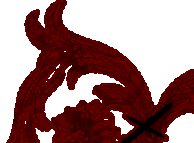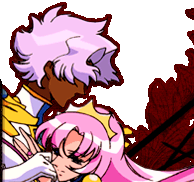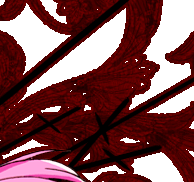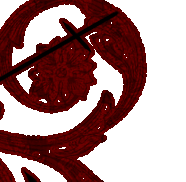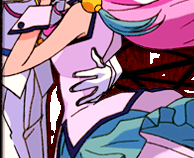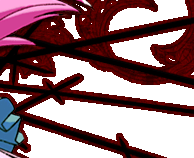
This analysis
was donated by Etrangere. 
One of Revolutionary Girl Utena,'s most fascinating feminist critiques is the study of the role of power and inequity in human relationships – especially but not only romance between men and women – and the harms it causes to people. Some of it is explored through the core political concept of Princehood and Revolution.
 The Prince This device paints the illusion of fairy tales for those with naive wishes in their hearts who say they wish something eternal existed, who say they wish the power of miracles existed. But, there's no place higher than this room. This room is the summit of Ohtori Academy, and of the world." – Akio Ohtori
We are given two images of what being a Prince means in Revolutionary Girl Utena.
On the one hand we have the ideal symbolized by Dios, the Prince that was, and which Utena aspires to become. This is a romantic as well as noble figure : the Prince is both a knight in shining armor, a rescuer of damsels in distress, and even a savior who selflessly sacrifices himself to save others (at which point note that he's at his most childlike); but he's also the representation of the male love interest, the Prince Charming that sweeps a young woman off her feet and makes her into a Princess. Revolutionary Girl Utena comments on how this romantic fairytale which is very much the narrative given to young girls and boys in mainstream culture ties the gender to those roles. A princess is by definition female, passive and in distress. A prince is by definition male, active and saving her. Every time people comment on Utena's desire to be a Prince by saying that she cannot because she's just a girl, the show problematizes it. That's not all, Utena's Princely role is also challenged because she also desires her own Prince, which means she should be a Princess, and therefore passive, in that pink Rose Bride dress that Akio gives her in the Upside-down Castle. As if a girl cannot both be a heroine and a (heterosexual?) sexual and romantic being at the same time. This Prince however is an ideal, belonging to the realm of archetypes and stories. In the real world, there was never such a Prince.
On the other hand, we have Akio, fallen Prince, who embodies the Prince as a creature of power. Like the ideal Prince, this realist Prince is dual. Akio is both the highest authority on the campus – the Acting Chairman – and a seducer whose capacities of sexual manipulation seem endless. A Prince doesn't only refer to a character in a fairytale, it's also the figure of the autocrat, reminding us of Machiavelli's essay on pragmatic statecraft. A meaning that is also underlined to us by Anthy's mention of cantarella, the poison said to have been used by the Borgias. Cesar Borgia – the historical figure that Machiavelli's Prince is centered upon – and Lucrezia Borgia are a pair of siblings that are not difficult to parallel with Akio and Anthy.
The topic in Revolutionary Girl Utena, however, isn't government, so this political lexicon is used in order to convey the concept of the role of power – concrete, pragmatic and abusive power – in romantic relationships, and how it is tied even at the heart of our fairy tale ideals. So the Prince isn't just the idea of a romantic savior, he's also the suzerain that demands obedience of all – a Prince knows no equal. If he wins a Princess hand in marriage, it is not just because she's beautiful, it's also because half of her father's kingdom goes with this marriage – much like Akio is Kanae's fiancé in order to wield her father's power on the campus as Acting Chairman. Our concept of romance, of personal relationships and of sexual desires, are highly unequal – even as ideals. And this inequity is, in many ways, what spurs the Duelists in action, to seek to revolutionize the world.
 The Duelists : On the Origin of the Inequality of Me I understand. I suppose you have no choice but to revolutionize the world." – Souji Mikage
We can analyze the reasons why the Duelist fight in many interesting ways, for the purpose of this essay I want to especially look at the way it is rooted to their relationship with one important person. For Saionji his on-and-off best friend Touga; for Miki his sister Kozue; for Juri her best friend, betrayer and secret subject of love Shiori; and for Nanami, her brother Touga. In SKU all those relationships, regardless of whether they're romantic in nature, are sexualized and therefore interesting to look at from a perspective of a problematic Romantic Ancien Regime.
All of those relationships have suffered a degradation in time from a moment the Duelist remember with rose tinted glasses; and because of that are a cause of much frustration. They feel like they lack power, control over the other people who are so dear to them. One of the main reason they fight in the Duels is to try to get back to power to be equal – or superior – to this person.
This is most clear with Saionji, which outright tell us he needs Anthy and Eternity in order to catch up to Touga and soothe his inferiority complex. Nanami also clearly feels that Touga is escaping her and that she needs to duel to maintain a close relationship to him and continue feeling superior to all the girls Touga sleeps with. And despite her own impressive standing and usual self confidence, Juri also doesn't feel like she is up to even confessing her love to Shiori. Miki never quite admits to himself that he's searching for a Kozue substitute in Anthy, but the fact that Kozue's sex adventures are outside of his control and disapproval, and the fact he decides to duel in order to prevent Anthy from being similarly outside of his control certainly fits the theme.
The frustration from inequality in relationship is even more obvious in the Black Rose Duelists. They all (aside from Kanae) have a relationship to one of the Duelists who are clearly, to them, special, superior people they cannot quite reach. Kozue cannot maintain a close relationship to her brother so turns to antagonizing him on purpose in order to retain his attention, Shiori feels inferior to Juri which is why she tried to get a man she thought Juri wanted in the first place and finding out Juri actually was in love with her doesn't help out, Tsuwabuki is too young compared to Nanami and not quite up to the comparison with Touga, Wakaba never feels quite as special as Saionji, Utena or Anthy; Keiko is just one of the girls in love with Touga and constantly humiliated and used by Nanami. Mikage as well, fell in love with Tokiko, but found out she was out of his reach when he witnessed Akio kissing her. As for Ruka, he clearly knows he has no chance with Juri and mainly wants to even the field for her by releasing the power Shiori has over her.
We're left with Touga, who's he one character whose reasons for dueling are never really explored. In the Shadow Girls his reasons are merely given as 'the Power of Revolutionize the World'; power, nakedly and without delusions of it being anything else. I'm inclined to see the part of the SKU movie which shows Touga as a child raped by his adoptive father as canon for the Revolutionary Girl Utena series because it ties in interestingly with Touga's later attitude to sex as a means of power (both in how he expresses his power over the girls in the campus, and how he seeks more power from Akio by sleeping with him) as well as his being already so cynical as a child when he finds Utena in the coffin. In any case, Touga's quite clear about wanting power, more power, regardless of his already quite elevated status, whether it is because he feels entitled to it or some kind of inner wound.
So the Duelists fight for power, for control, and the Prize they all seek would be for them a means to regain the power they feel they've lost over this one person, a way to rekindle a more equal relationship. Many of the problems in inequity in their relationships can also be rooted in problematic gender and romantic models : for example Saionji never feels as strong and in control as the traditional male role assigns him to be, which he overcompensates by being so aggressive and abusive to Anthy. All the Duelists in their various ways, project this desire for power onto Anthy. The Rose Bride, because she is submissive to the Victor and because she is the key to unlock the Power of Dios.
 The Rose Bride Girls...girls are all like the Bride of the Rose in the end." – Anthy Himemiya
a. Princesses & Witches
The figure of Anthy the Rose Bride is probably the most fascinating and complex of SKU. Like the Prince, the Rose Bride is a dual creature, but unlike the Prince, she isn't divided between a fairytale and a realistic role, instead her two aspects reflect the contradiction of the role of women as it is constructed by society, Madonna and Whore : idealized as long as she complies to a specific submissive role which does not allow conflict, reviled as a manipulative temptress anytime she tries to claim agency for herself; and always defined through the lens of the sexual desire men feel for her.
On first look, the Rose Bride is like a princess – except without any of the perks – she is the damsel awaiting rescue, the prize to be won by dashing Duelists, she is passive, polite, obedient and quiet in demeanor, beautiful of course, bonding with plants and animals like a Disney Princess, good with cleaning and keeping the room tidy but not, the one exception, good with cooking – probably because cooking is even more strongly a reminder of the role of the Witch always at her cauldron so that when Anthy cooks she unleashes a curse. The Rose Bride however doesn't enjoy any respect for her status and doesn't have any authority of her own like a princess would. She is a mockery of the role of Princess. This is both because Anthy herself is mocking the Princesses that used to take the Rose Prince away and because Anthy is ever to be punished as the Witch.
In the Rose Tale we are told Anthy is the Witch because "women who can't be princesses have no choice but to become witches", in other words, all women who are not wanted, desired, seen as good enough by men, are to be seen as dangerous, spiteful, malevolent creatures. All women who do not cling to the role that patriarchal society would give to them as women, are to be rejected and punished, aren't worth considering for anything else. A Witch is still seen as powerful, but in fairy tales she only ever uses it in jealous way against the youngest princess; she never uses power in order to rule the land like the dark aspect of the Prince, only to deprive others of what they think is legitimately theirs – like the Princesses think the Prince is theirs. She has power, but only as a threat – so that the people are justified to punish her endlessly. Anthy being the Witch in SKU, is an expression of her being the ultimate scapegoat. She's the Witch, she poisons wells and cast curses. Everything that goes bad is always her fault, and she's always, endlessly being punished for it, slapped by almost everyone on Ohtori and suffering the pain of the Thousand Swords of Hatred. Anthy isn't innocent, she does act in small and big acts of malice to get back at the people she doesn't like. She targets Nanami, especially, who is so Princess-like and similar to Anthy in many ways; and she manipulates the Duelists in order to orchestrate the duels alongside Akio; but most of the hostility she receives goes well beyond and happens before any of her petty acts. For women, as well, if they sidestep outside of the role society give them, they are punished way beyond the harm their infractions may have caused. And when something wrong happens to them, society is quick to ask 'what did you do to deserve it?' instead of blaming the perpetrator.
b. Exchanges of Women
Alongside those dual aspects of the Rose Bride, what is the most unique, specific aspect of the Rose Bride is that she is won in the Duels. In other words, the Rose Bride is constantly passed from Duelist to Duelist, without stated regard for her own will, to become Bride of whoever is strongest this time.
This also is a reflection of the role women are given in society. In the field of Anthropology, Claude Levi-Strauss in The Elementary Structures of Kinship talks about how one of the universal structure of culture is defining how women are exchanged by family groups along specific rules creating kinship systems. The necessity to exchange women is the origin of the taboo of incest : women need to be unavailable to their own brothers so they can be free to be given as wives to another family group. And by creating those ties, other things, ideas and goods, dowries and bride price, are exchanged between family groups : alliances of power and wealth are thus created. Historically, this has been especially true amongst members of the class of power, aristocrats and princes.
Thus the Rose Bride is always given, by Akio, to the Duelists with promise of a luxurious dowry in the form of the Prize they hope to win, in order to help him manipulate them. Like Lucrezia Borgia, who was betrothed twice before she was thirteen and wedded three times in order to advance the political ambitions of her menfolks. Many rumors also cast Lucrezia in a very Witch-like role, with suspicion of poisoning her husbands; and many rumors of incest also surround her.
The way men are exchanging women for their own profit and power is underlined a few ways in SKU through the series : as already mentioned, there is Kanae, who is given by her father to Akio, resulting in Akio's position of power in the Campus. Nanami also, when Touga plays the role of giving her the ring to make her a Duelist, pimping her to Akio's games in order to advance his goal of winning against Utena. The way Saionji's rivalry with Touga expresses itself by focusing on Anthy, also, is a reminder of this objectification of the Rose Bride as a prize : Saionji seeks to win Anthy because she's a proof of status and power.
Obviously the tie to the incest taboo isn't to be taken literally with Anthy, who plays the role of Rose Bride at the same time as she is still sexually involved with her bother unbeknown to her Victor. However the role that the motif of incest in SKU can still be better understood by this idea. In all three pair of incestuous or pseudo-incestuous siblings, the natural bond between the two siblings precludes them joining with other people. Anthy prevented Dios from risking himself for the Princesses. Nanami looks up to Touga as the ideal man, and therefore no other men can compare; and in return she shows herself very possessive of Touga. Kozue is jealous of Miki as well, and uses Miki's own less conscious jealousy in order to maintain some control on him while all her boyfriends have no importance to her heart. Only if they let go of this sexual possessiveness toward their sibling can they start forming connection with other people in society. This is formulating in a very Freudian way, the girls fixate on their elder brothers as an ideal of manhood – of Princehood – to play with the idea of romance before moving to the real thing, at least with Nanami, the least truly incestuous of the sisters. For Kozue, who rejects her parents' authority and the idea of society ("we're wild animals"), this is a more difficult step to make. This also echoes the imagery of the chick and the egg, and of the necessity of growing up into adulthood that also underlies a lot of the thematic of SKU, although this is a bit beyond the scope of this essay.
c. Goddess of fertility
In general, women's sexuality must be controlled by men, whether it is her father, brothers or husband, in order to control the flow of power that comes from them. In SKU, sex is never just a cigar, it's always a mean to gain power over someone. All manipulations in SKU are heavily tied to seduction, from relatively innocent ones, to more nefarious power plays. Touga, Mikage, Ruka, Kozue and Akio especially all use their sex appeal in order to control both women and men, and seduce characters or taunt them into doing what they want them to do. So does Anthy, of course, under order of Akio.
Anthy's power as sexual, and the Power of Dios tied to her, is reinforced through the series in many ways, but the most frequent one is the entering the Duel sequence, which is a series of symbols about female sexuality. The Forbidden Forest looks like an inverted female pubis; the gate which must be open by turning it wet; the spiral stairs reminding us of a strand of DNA (especially obvious in the second ED); and the dual arena which is suggestive of labia seen from profile. All the roses and the many motives of roses in the series are also, of course, a symbol for female sexuality and genitals. In many ways this indicates that under the guise of Dios, Eternity, Shining Things, Miracles that the Duelists get distracted with, the real goal of the Duels are the Rose Gate (and the Gate requires water, no phallic sword, to be opened), Anthy, the power of women's sexuality.
 Woman's sexuality is a source of power because without it there is no reproduction. A Prince is one because he is born from another Prince, and he seeks a Princess so they'll live happily ever after and more importantly, will have many children one of which will one day inherit the kingdom. Without childbirth, there is no dynasty of Princes, and in an anthropological vision as well, the system of inheritance, determining who's a legitimate heir for wealth and status is essential to society's structures. Therefore men must control women's sexuality, much like Akio must control the Rose Bride in order to keep playing everyone like puppets on the campus.
Woman's sexuality is a source of power because without it there is no reproduction. A Prince is one because he is born from another Prince, and he seeks a Princess so they'll live happily ever after and more importantly, will have many children one of which will one day inherit the kingdom. Without childbirth, there is no dynasty of Princes, and in an anthropological vision as well, the system of inheritance, determining who's a legitimate heir for wealth and status is essential to society's structures. Therefore men must control women's sexuality, much like Akio must control the Rose Bride in order to keep playing everyone like puppets on the campus.
In Revolutionary Girl Utena this is only hinted at, the most direct way in which the story addresses the idea is the episode Nanami's Egg, a lengthy metaphor of a girl's first menstruation which also addresses girl facing the responsibility of motherhood in the way Nanami deals with the egg, considering both nurturing it with joy and care, and abandoning it when her brother react negatively to the possibility of her being a teenage mother. Actually Touga's reactions in Nanami's Egg – besides hysterically hypocritical – very much address the way men seek to control women's sexuality as capacity of reproduction : forbidding Nanami to express a lesbian sexuality that would prevent her from the reproductive role assigned by Patriarchal society; but also forbidding Nanami from reproduction outside the norm of a marriage-alliance decided by the men. The episode also ties the whole event to the idea of reincarnation, which thematically opposes the idea of the Eternity, the stasis of the coffin that the Duelists search to maintain and escape at the same time and which, in the end, we learn is Anthy's punishment : eternal pain. In the entering the duel arena sequence, also, while the images are of yonic symbols, the lyrics talk mainly of the idea of reproduction, birth and death :
Birth records
Baptismal records
Death records
[…]
My own birth,
Absolute birth,
Apocalypse
A wet-nurse and a midwife in a dark desert
Beyond the Rose Gate is Anthy's own power of fertility, in other words, her power of growth. Growing roses and growing beyond an egg into adulthood. Not the Eternity of immobility, but the continuity of cycles of evolutions and revolutions.
 Revolution It's alright now. Please go on playing make-believe 'Prince' in this comfortable little coffin forever. But I must go." – Anthy Himemiya
Like 'Prince', revolution is a word with a highly political tonality. Unlike 'Prince', it does not remind us of anything related to fairytale and romance, so it stands even more at odd in the context of the series, mystifying the viewer and begging for an explanation. The French frequently used in Revolutionary Girl Utena, as well as the 18th century style of the Student Council uniforms, and even the rose and gender bending motifs all play to bring in mind the famous old manga Rose of Versailles set during the French Revolution of 1789. Thematically, Rose of Versailles also plays onto the problem of love between people of different social standing, and the way that women are alienated and oppressed in society and either forced into alliances not of their choosing for dynastic reasons, or forced to discard the role of a woman altogether with their desire for love along the way. The main characters eventually love in spite of societal barriers they face, but all die tragically in the revolution that destroys the old order of the world.
With this in mind, I believe that Revolution in Revolutionary Girl Utena refers to the idea of unmaking the romantic ideal of relationships based upon the conceits of Princes and a Princesses; and forging a new, more equal ideal for romantic relationships and friendships. The concept of Prince is revealed as an utter failure, both in ideal and in reality. It was a failure in Dios because people overly relied onto his capacities as a Prince to solve their smallest problems to the point of driving him near death with exhaustion whereupon Anthy had to step in to remove him. It is a failure in Akio because no matter how seductive he is, he is manipulative, selfish and abusive. It is also a failure in Utena. Her initial attempt at Princedom, she eventually admits was conceited : in order to feel noble and cool as a Prince, she needed Anthy as a Rose Bride, as someone subservient and needing rescuing, but without realizing Anthy's real need and pain throughout. When she really steps up selflessly to be a Prince to Anthy and manages this way to open the Rose Gate, she still fails to grab Anthy's hand.
Yet Utena succeeds, not as a Prince, but as a Revolutionary, by inspiring Anthy to step up herself out of her subservient role as the Rose Bride and save herself. Thus, together they destroy the archetype of the Prince and the Princess and are on their way to create a new, more equal ideal as friends and soulmates. Their example also manages to help all the Duelists break from their fixation on their idealized memories and move on toward smashing their own coffins. This is the Revolution in Revolutionary Girl Utena.
 |

